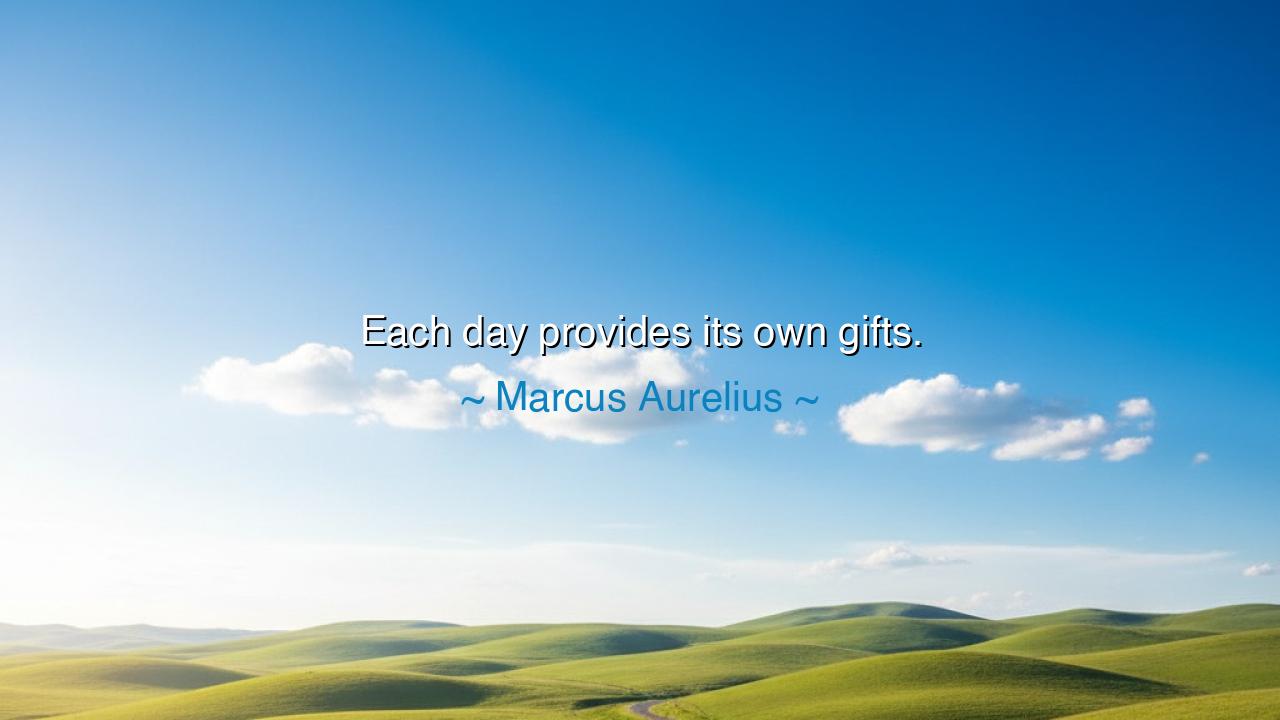
Each day provides its own gifts.






“Each day provides its own gifts.”
So wrote Marcus Aurelius, emperor and philosopher, whose crown was not of gold alone but of thought and virtue. These words, simple yet profound, come from the heart of his Meditations — a work born not in luxury but in solitude, composed in the camps of war and the long nights of empire. In them, Marcus teaches us the way of Stoic wisdom, the path that sees the divine order within all things. When he says that each day provides its own gifts, he is reminding us that life, in its quiet unfolding, offers blessings hidden even in its hardships — that every sunrise brings something meant to shape and strengthen the soul.
Marcus Aurelius ruled a world shaken by plague, rebellion, and uncertainty. Yet amid the chaos, he turned inward to the eternal calm of reason and faith. He did not seek comfort in fortune or fame, but in the rhythm of the present moment. For the Stoics believed that the universe — guided by Logos, the divine order — gives each man what he needs, not what he wants. Therefore, the wise must look upon each day not with complaint, but with gratitude, knowing that within it lies a lesson, a challenge, or a quiet joy. To say “each day provides its own gifts” is to live with eyes open — to see that even suffering may be a teacher, even loss a form of grace.
This teaching is not a call to blind optimism, but to perception. Many live as though the days were mere repetitions, chasing tomorrow and ignoring today. But Marcus reminds us that every day, no matter how ordinary, is unique — a single, unrepeatable gift from time. The sun may rise a thousand times, yet each dawn is different in its light. To the grateful heart, there is wonder in small things: a friend’s word, a stranger’s kindness, the strength to endure, the chance to begin again. When we awaken to this truth, life ceases to be a burden and becomes a sacred unfolding.
History gives us many who have lived by this wisdom. Think of Helen Keller, who, though robbed of sight and hearing, learned to see with the heart and to listen with the soul. Each day, though filled with difficulty, offered her something — a new word, a new sensation, a new step toward understanding. “Everything has its wonders,” she once said, “even darkness and silence.” She did not wait for fortune to change her world; she found the gifts hidden in the moment itself. Like Marcus, she discovered that gratitude and awareness can transform even the harshest life into a field of learning and light.
Yet this truth is often lost on those who hurry through their days. The modern heart is restless — always reaching, never receiving. We complain of monotony, of fate, of lack, but rarely pause to see the blessings that lie quietly before us. To live as Marcus teaches is to slow one’s steps, to breathe, to observe, and to give thanks. The day’s gifts may not come in beauty or ease; they may come in labor, in loss, in silence. But if we meet them with humility, we will find that every hour brings something that nourishes the spirit — a lesson in patience, courage, compassion, or peace.
The lesson, then, is simple but eternal: live presently, and receive gratefully. Begin each morning with the question, “What will this day teach me?” End each night with the reflection, “What did this day give me?” In doing so, you will find that even the smallest things — the warmth of sunlight, a task completed, a word of forgiveness — are treasures beyond measure. When the heart is open, nothing is wasted; when the mind is calm, every day becomes holy.
So remember, child of the living world: do not despise the day for its simplicity, nor curse it for its trials. The universe gives to each dawn its purpose, as it gives to each soul its path. Some days will offer joy, others sorrow; some will grant triumph, others endurance. But all are gifts, and to live wisely is to unwrap them with reverence. As Marcus Aurelius knew beneath the vast sky of empire: each day provides its own gifts, and the soul that knows how to receive them has already found the way to peace.






AAdministratorAdministrator
Welcome, honored guests. Please leave a comment, we will respond soon